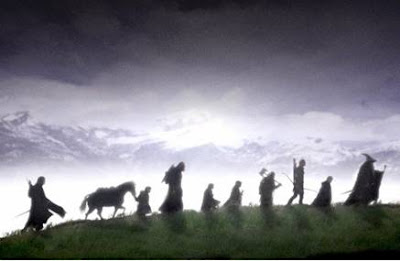GM's are often faced with 'The Journey' as a significant plot element in any story. Just look at Tolkien. Practically all of The Lord of the Rings is a journey. I have played games where the journey is little more than a series of randomly generated encounters. In other games the journey has been glossed over completely and we start the game at the Dungeon entrance. In my own D&D campaign over two thirds of the last adventure I ran took place 'on the road'.
 It could be argued that 'The Journey' as a plot device is overused but I would argue that it is central to every story ever written. The main character or characters either go on a physical journey in the story or a mental or emotional journey as a result of some event. Even the reader is taken on a journey as the story is told. Without a destination there is no point starting out, and therefore no story to tell.
It could be argued that 'The Journey' as a plot device is overused but I would argue that it is central to every story ever written. The main character or characters either go on a physical journey in the story or a mental or emotional journey as a result of some event. Even the reader is taken on a journey as the story is told. Without a destination there is no point starting out, and therefore no story to tell.Which leads to the true point of this post. What drives the journey? In the current campaign , indeed in most fantasy campaigns, its a MacGuffin. This is an object (an artifact, location or NPC) which drives the actions of the characters. It's actual nature is not necessarily important to the story so long as the characters treat it the same way. In the current campaign the MacGuffin is a "Sceptre of Power" but it could just as easily be the "Chamber Pot of Authority". Ultimately the artifact is unimportant, it's the journey that counts.
I think Bilbo Baggins's book was entitled 'There and Back Again'. The story of the return of the hero is an integral part of 'The Journey' story type. Needs a fairly well developed world for this to be replicated in a game but, when it is, the sense of completion is palpable.
ReplyDelete